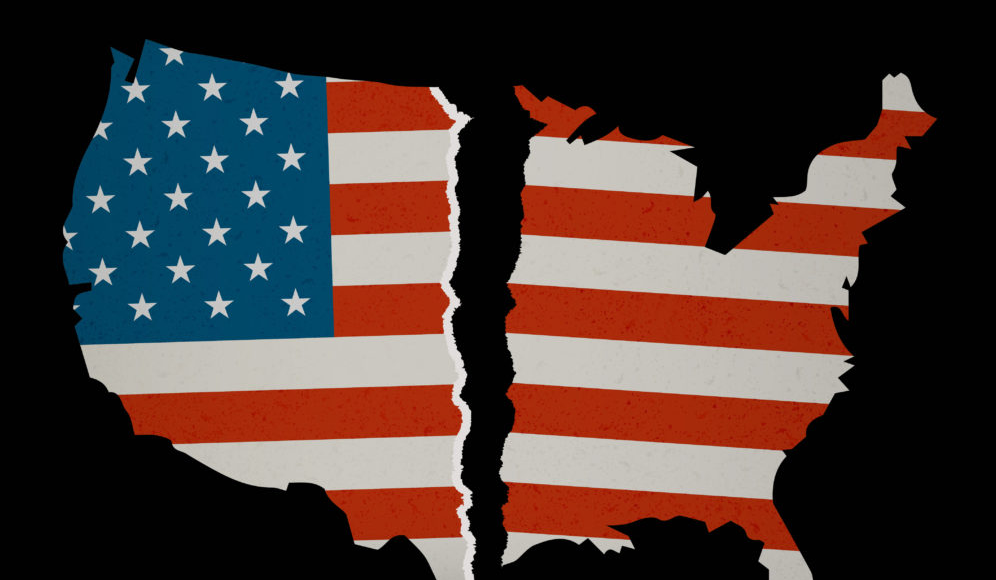One of the things that I hear a lot of from Republicans is that “We have to grow the economy.” Sure, the economy is important, but is that the only thing a country is? Is the United States nothing more than an economic zone?
I don’t discount that money is important, and yes, I would like more of it. However, I can’t help but think that a country is more than just an economic zone. If you look at the Declaration of Independence that announced our intention of separating from England, it does not say “grow the economy”. The closest it might get to that is saying “For cutting off our trade with all parts of the world” and “For imposing taxes without our consent”, but it doesn’t even get to those two items before listing about 15 grievances before that mainly dealing with administration and justice. “Taxation without representation” is a slogan used today because it is the easiest one of all for us to understand. However, assuming that they leveled accusations against the Royal Crown in order of which aggrieved them most, they were much more upset about “mock trials”, “quartering large bodies of armed troops among us”, and not allowing governors elected by the colonists to govern.
When I was growing up and also in college, I can remember being told by professors that America has no culture of its own. Having been living in France, I thought that was a totally foolish thing to say. The French certainly believed that America had a culture. The French often derided American culture and its influence in France even while enjoying the latest Hollywood blockbuster. In fact, all countries have cultures that seem distinct to it.
What is a country? What is a nation? What is a common culture? I remember hearing an interview with a Quebecois separatist. He was saying that for him, going to Toronto was just as much going to a foreign city as his going to New York. Language is an obvious part of a common culture. We should keep that in mind as more and more things are done in Spanish, or any other foreign language.
Another part of culture is religion. We are seeing that currently in the Middle East where two Semitic peoples are trying to wipe each other off the planet. (Yes, I’ll admit that’s a bit debatable as the Ashkenazi Jews brought a lot of European DNA back with them when they left Europe). Their problems with each other a largely over religion.
Is a country set up to protect a specific population? One would think that the Founding Fathers would have responded in the affirmative on that one. After all, the U.S. Constitution was ratified in 1788. Two years later, they passed the Nationality Act of 1790 which limited citizenship to “free white persons” of “good character“. No one back then seemed to be worried about defining who a white person was, but judging by the fact that most immigration was coming from England, Scotland, Ireland, and Germany, we can sort of extrapolate that those were the ones the Founders wanted coming to our shores.
While the Founding Fathers were certainly worried about the economy, they suffered serious economic consequences for their actions, that did not seem to be their only concern. After all, in the Bill of Rights, freedom of assembly, of religion and of speech seemed paramount on their minds.
Today, a lot of the wealthy of our nation, the globalist class, seems to believe America is nothing more than an economic zone that can be expanded to encompass Mexico and Canada through trade deals like NAFTA. Mexican President Vicente Fox proposed having open borders between the U.S. and Mexico, and George W. Bush seemed largely in favor of it too with the U.S.-Mexico Border Partnership Agreement, and the Security and Prosperity Partnership . (That’s something the current administration has sort of achieved by simply not enforcing the law).
Back in 2018, Michael Anton penned an opinion piece in the Washington Post asking “Why do we need more people in this country, anyway?” Anton cites Paul Samuelson as saying that Social Security is a Ponzi scheme. We will always need young people to outnumber retirees. That’s a good question. When America has 500 million people closing in on retirement, will we then need 1 billion young people to sustain them? And, when we have 1 billion people retiring, will we need 2 billion people to sustain them, and so forth? With technology replacing so many jobs, we will likely have a larger and larger portions of the population on some form of government hand out.
Currently, illegal aliens coming across the border are getting money given to them by the states they are invading. This allows illegal aliens to then work off the books for an even cheaper wage and driving down the wages of native born Americans, as well as, previous immigrants.
Those that believe we have to grow the economy are doing so at the expense of keeping the country together as one.

=================
I was listening to the CIS.org’s podcast of Parsing Immigration “Do Immigrants Transplant Certain Cultural Traits?” In the podcast, they mention the book Albion’s Seed: Four British Folkways in America by David Hackett Fischer. Author Fischer documents how different groups immigrating to the British Colonies brought with them different parts of their culture depending on where they were from in the United Kingdom. The protestants in New England brought different customs of food, and dress, but also different attitudes. The more aristocratic immigrants to the southern United States adapted more easily to slavery since they were used to having servants and serfs beneath them.

In the podcast, host Mark Krikorian and author Jason Richwine discuss how in southern Americans migrating to other parts of the United States, they too brought their customs (their food, their religion, their music etc..) with them. Among other things, they discuss the book, The Culture Transplant: How Migrants Make the Economies They Move To a Lot Like the Ones They Left. Italians bring low trust societies with them, and Swedes bring high trust societies with them.
Earlier, author Francis Fukuyama wrote Trust: The Social Virtue and the Creation of Prosperity. “The Chinese, on the other hand, have a largely familistic society, which stresses family bonds over other social loyalties. This explains not only why there are few Chinese companies with global brand names like Wang laboratories, but also the reason for Wang’s dissolution–An Wang’s inability to break the chain of family management.” Famously, Harvard Professor Robert Putnam published a paper that found that multiculturalism led to lower levels of trust between neighbors. In fact, the liberal Putnam was so disappointed by his findings, that he didn’t publish them for several years and when he did, he published it in an obscure journal leaving the Boston Globe to find it out.
In contrast to familistic trust in countries like China, Italy, and parts of France, Fukuyama highlights high trust societies like Holland, Sweden, and Switzerland–small countries without classical economic scale, which nonetheless host major global corporations.
It is not a surprise that currently with immigration, we are seeing non-assimilation as Muslims chant prayer calls in Dearborn, Michigan. In the meantime, on the southwest border, the immigrants bring Roman Catholicism with them along with their own foods, music, language, and superstitions like Dia de los Muertos. They are not assimilating to traditional American values, we are tolerating theirs.
=============
As part of culture, you might not see religion, but religion sees you. Even if you are an atheist, if you were raised in a Christian nation, you likely celebrated Thanksgiving and Christmas which are two religious holidays. Easter break is still a thing in many schools. In France, we used to get two weeks off for Christmas and two weeks off of school for Easter. In majority Christian nations, we have Saturday and Sunday off because our ancestors did attend Church on Sunday even if many of their descendants do not. Some Muslim nations have Thursday and Friday as their weekend, and others have Friday and Saturday. Israel has Friday and Saturday as their weekend. This is all part of religion influencing the common culture of a nation.
Sure, we all have freedom of religion in America, but try doing a bank transaction on a Sunday if you are an atheist or a Muslim. My point being that Christianity is part of western culture whether you want it be or not.
Was the United States founded as a Christian nation? That’s something a lot of people argue about. Eight years after ratifying the U.S. Constitution, a treaty was signed between the United States and Tripoli, essentially the Barbary Pirates. In article 11 of the treaty, the following was cited: “As the government of the United States of America is not in any sense founded on the Christian Religion, — as it has in itself no character of enmity against the laws, religion or tranquility of Musselmen, — and as the said States never have entered into any war or act of hostility against any Mehomitan nation, it is declared by the parties that no pretext arising from religious opinions shall ever produce an interruption of the harmony existing between the two countries.” Some have taken this to mean that the United States was not founded as a Christian nation, while others have taken it as a step to try and appease the Barbary Pirates. If it meant to appease them, it did not work. Jefferson and John Adams talked with Tripoli’s ambassador Sidi Haji Abdrahaman and asked him why he extorted money and took slaves. The good ambassador replied, “The ambassador answered us that [the right] was founded on the Laws of the Prophet, that it was written in their Koran, that all nations who should not have answered their authority were sinners, that it was their right and duty to make war upon them wherever they could be found, and to make slaves of all they could take as prisoners, and that every Mussulman who should be slain in battle was sure to go to Paradise.” So much for trying to appease the Muslim Barbary Pirates by telling them we had freedom of religion in the United States. Later, when Thomas Jefferson became President, he made sure to beef up the U.S. Navy and send them over to the Mediterranean Sea to fight the pirates. It turned out that in Muslim eyes, we were heathens whether we wanted to admit it or not. Think of that as we are set to import more illegal aliens than ever before into the United States.

Above story: “During the fighting Decatur’s younger brother, James Decatur, in command of a gunboat, was mortally wounded by a Tripolitan captain during the boarding of a vessel feigning surrender. Midshipman Brown, who was next in command after James, managed to break away from the ambushing vessel and immediately approached Decatur’s gunboat bringing the news of his brother’s fatal injury. Decatur had just captured his first Tripolitan vessel and upon receiving the news turned command of his captured prize over to Lieutenant Jonathan Thorn and immediately set out to avenge his brother’s treacherous injury. After catching up with and pulling alongside the Tripolitan ship, Decatur was the first to board the enemy vessel with Midshipman Macdonough at his heels along with nine volunteer crew members. Decatur and his crew were outnumbered 5 to 1 but were organized and kept their form, fighting furiously side by side. Decatur had little trouble singling out the corsair captain, the man responsible for James’ mortal wound, and immediately engaged the man. He was a large and formidable man in Muslim garb, and armed with a boarding pike he thrust his weapon at Decatur’s chest. Armed with a cutlass, Decatur deflected the lunge, breaking his own weapon at the hilt. During the fight Decatur was almost killed by another Tripolitan crew member, but his life was spared by the already wounded Daniel Frazier, a crewman who threw himself over Decatur just in time, receiving a blow intended for Decatur to his own head; Frazier’s act of heroism later got wrongly attributed to Reuben James. The struggle continued, with the Tripolitan captain, being larger and stronger than Decatur, gaining the upper hand. Armed with a dagger the Tripolitan attempted to stab Decatur in the heart, but while wrestling the arm of his adversary, Decatur managed to take hold of his pistol and fired a shot point blank, immediately killing his formidable foe. When the fighting was over, 21 Tripolitans were dead with only three taken alive.”
==========
I was listening to John Derbyshire’s podcast over at VDare. He brought up British demographer Paul Morland’s trilemma (like a dilemma, but with three options instead of two). In Morland’s trilemma, a nation has three options, 1) Ethnic continuity 2) A thriving Economy and 3) A comfortable lifestyle without the stress of mixing child raising and a modern economy. Japan appears to be taking options 1&3. Britain is taking 2&3. Israel is taking 1&2. Derbyshire whittles the trilemma down to three words, 1) ethno-nationalism, 2) economism, and 3) hedonism. Interestingly, the hedonists at the party in Israel that was raided by Hamas had option three taken from them rather involuntarily.
It appears that America, like Britain and much of the West, is taking options two and three. The Immigration and Nationality Act of 1965 (the Hart-Celler Act) destroyed the national origin quota system that kept America white European. Subsequent court rulings and things like Reagan’s 1986 amnesty along with non-existent immigration enforcement have helped ensure that non-white immigration coming over the southern border will not cease anytime soon.
I cannot help but believe that this relentless drive to “we have to grow the economy” is rather a short sighted attempt to stay wealthy as the bonds that form a nation and its culture are torn asunder.

Lee Kuan Yew was the Prime Minister of Singapore for 31 years taking it from a relatively poor country to a prosperous one.
20 year veteran of the U.S. Border Patrol. Author of "What Bridge Do You Work At? Or, Kids Are Cute; Therefore, Open Borders" & "East into the Sunset: Memories of patrolling in the Rio Grande Valley at the turn of the century". Books are available at Amazon, Barnes and Noble, as well as Thrift Books.
Master's Degree in Justice, Law and Society from American University.
Grew up partly in Europe.













